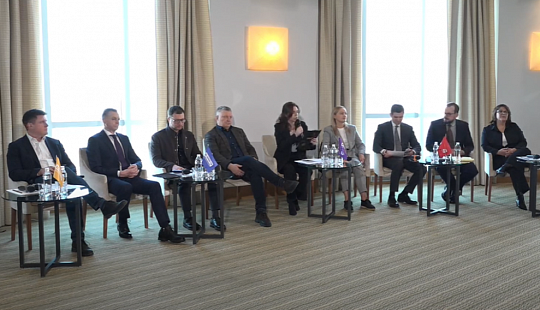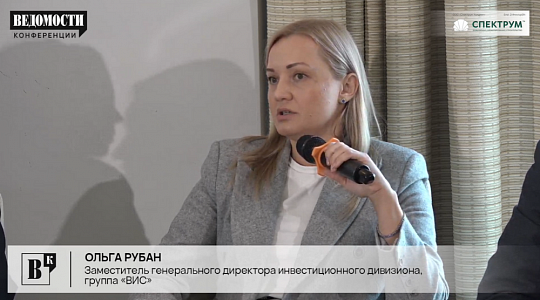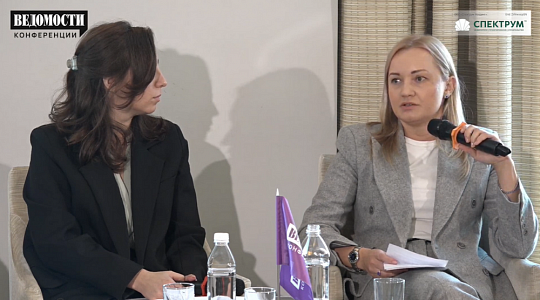28.02.2024
The theme of the discussion declared by the organizers was: “Infrastructure for the country 2024: new construction projects, new challenges.” The invited speakers discussed the challenges holding back infrastructure development and the measures required to overcome them. These include the objectively high key rate of the Central Bank, which slows down the launch of new projects, and the restrained use of various financing instruments, including infrastructure bonds. Additional government support measures are needed for further growth and the initiation of new investment projects, including preferential lending conditions for infrastructure projects.
VIS Group is one of the few major market participants who implements PPP projects using the mechanism of private concession initiative throughout the entire life cycle - from structuring and organizing financing to design, construction and operation of facilities. More than 150 billion rubles in extra-budgetary investments, including 14 billion rubles from bond issues, have already been attracted to the holding’s projects. CEO of the National PPP Center Pavel Seleznev noted with regret that the number of players such as VIS Group in the market is declining.
“Public-private partnerships were conceived throughout the world primarily to develop the private initiative for the implementation of infrastructure projects needed by the state and society. At the moment, our PPP mechanism has become more of a mechanism for bringing budget funds to regional infrastructure projects, where the operators of these funds are either state banks or development institutions. Of course, I would like to see the role of private initiative grow, so that there are more businesses entering the PPP market,” noted Pavel Seleznev.
In a turbulent economic situation, the insufficiency of government support measures and project teams with high industry competence in the regions often leads to delays in the implementation of socially and economically significant projects.
“PPP is a partnership where partners must move in sync and solve issues to achieve a single goal. Unfortunately, our regions do not always know how to interpret certain issues within the framework of a concession; they often rely on the practice of government procurement, which is fundamentally different,” shared Olga Ruban. “Numerous issues arise, making the concessionaire unprotected, thus increasing commercial risks. There is a need for a federal government-level platform so that such controversial issues can be resolved without stopping or delaying project implementation. As of today, there is no such body in the market.”
According to the National PPP Center, the current capacity of the PPP market is about 5 trillion rubles. These are 3,500 ongoing projects that utilize extra-budgetary investments.
The PPP market needs new incentives for the development of private initiative
The Vedomosti newspaper invited experts from the public-private partnership market to discuss key problems and prospects in industry development. The round table, held today at the capital's Swissôtel Krasnye Holmy, was attended by heads of major financial institutions, including VEB.rf and DOM.rf, representatives of leading regions in the PPP sphere, the National PPP Center, investment and infrastructure companies. VIS Group was represented by Deputy CEO of the Investment Division Olga Ruban.The theme of the discussion declared by the organizers was: “Infrastructure for the country 2024: new construction projects, new challenges.” The invited speakers discussed the challenges holding back infrastructure development and the measures required to overcome them. These include the objectively high key rate of the Central Bank, which slows down the launch of new projects, and the restrained use of various financing instruments, including infrastructure bonds. Additional government support measures are needed for further growth and the initiation of new investment projects, including preferential lending conditions for infrastructure projects.
VIS Group is one of the few major market participants who implements PPP projects using the mechanism of private concession initiative throughout the entire life cycle - from structuring and organizing financing to design, construction and operation of facilities. More than 150 billion rubles in extra-budgetary investments, including 14 billion rubles from bond issues, have already been attracted to the holding’s projects. CEO of the National PPP Center Pavel Seleznev noted with regret that the number of players such as VIS Group in the market is declining.
“Public-private partnerships were conceived throughout the world primarily to develop the private initiative for the implementation of infrastructure projects needed by the state and society. At the moment, our PPP mechanism has become more of a mechanism for bringing budget funds to regional infrastructure projects, where the operators of these funds are either state banks or development institutions. Of course, I would like to see the role of private initiative grow, so that there are more businesses entering the PPP market,” noted Pavel Seleznev.
In a turbulent economic situation, the insufficiency of government support measures and project teams with high industry competence in the regions often leads to delays in the implementation of socially and economically significant projects.
“PPP is a partnership where partners must move in sync and solve issues to achieve a single goal. Unfortunately, our regions do not always know how to interpret certain issues within the framework of a concession; they often rely on the practice of government procurement, which is fundamentally different,” shared Olga Ruban. “Numerous issues arise, making the concessionaire unprotected, thus increasing commercial risks. There is a need for a federal government-level platform so that such controversial issues can be resolved without stopping or delaying project implementation. As of today, there is no such body in the market.”
According to the National PPP Center, the current capacity of the PPP market is about 5 trillion rubles. These are 3,500 ongoing projects that utilize extra-budgetary investments.



